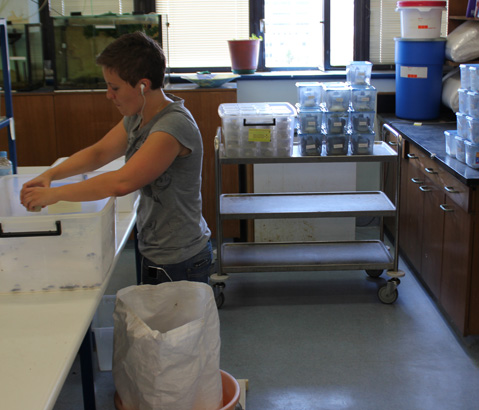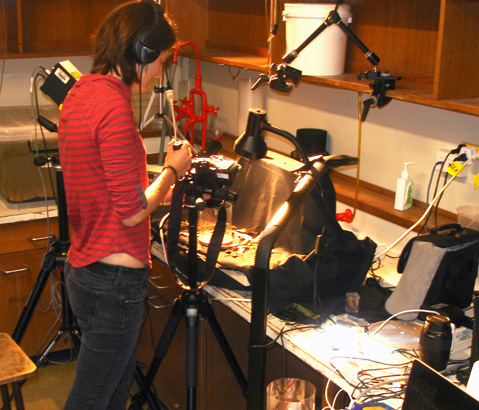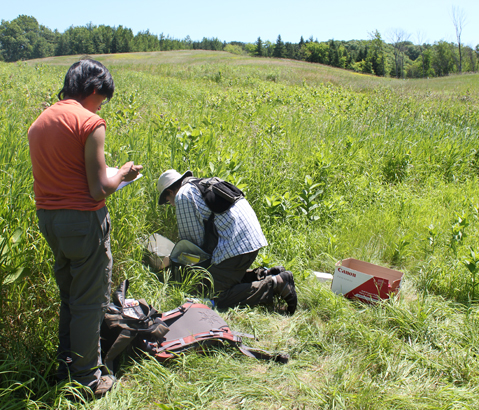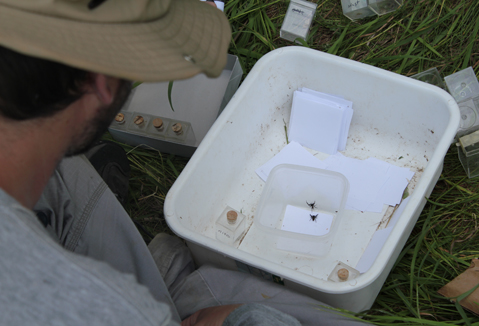Interconnecting the genotype and the environment using gene experession
The phenotype is determined by complex interactions between the genotype and the environment. Despite the recent insight demonstrating the importance of gene expression in developing phenotypes, we still have a poor understanding of the ecological factors responsible for such variation. The goal of this proposal is to examine how gene sequence and expression profiles differ in response to sexual selection-the factor that is most responsible for the evolution of elaborate traits and speciation.
This project will examine sex differences in gene expression in a species where the sexes differentially alter their development in an adaptive manner. This will provide insight into the relative importance of genes and the environment in determining phenotypic expression and how selection affects genetic information. Further, these results will reveal the mechanism by which the sexes mediate intragenomic sexual conflict; a necessary understanding as we move towards a more integrative understanding of ecology, development and evolution.
Re-evaluating evolution by examining developmental plasticity in response to the social environment
Variation in reproductive success is the central tenet of sexual selection, and a key principle underlying the entirety of evolutionary theory. Explaining the factors driving variation is thus among the chief goals of ecology and evolutionary biology. Researchers especially seek to identify traits that grant increased fitness and use trait expression as an indicator of ‘quality'. Unlike fitness, however, quality is a vague term either used as a surrogate for fitness, or describes traits correlated with fitness in a particular context. Because sexually selected traits are costly to produce, one definition of quality centers around genetic variation in condition.
As quality is relative to rivals and my research shows that juveniles ‘eavesdrop’ on adult interactions to adaptively alter trait expression to exploit rivals, a more integrative view of quality that incorporates this adaptive developmental tactic with condition dependence is required. This avenue of my research will provide a more holistic view of how evolution functions by highlighting the importance of the competitive context and adult experiences in trait expression.
How variation in the social environment affects selection and development
Researchers have begun to realize that the strength and direction of selection that individuals encounter can change even within an individual’s lifetime. As this can have a pronounced effect on phenotype-fitness correlations, it is important to understand how changes in the social environment can affect such shifts. A part of my research focuses on examining fitness in fluctuating environments in natural populations.
To understand the effect of a fluctuating social environment requires understanding the effect it has on development as well as adult fitness as cues of the adult competitive environment have an enormous impact on juvenile developmental trajectories. This is a major focus of my research—determining the cues juveniles use to assess the social environment and understanding how individuals shift resource allocation. I have now discovered developmental tactics in numerous taxa in response to a variety of sensory information and am interested in determining the genetic pathways controlling these decisions.
Male quality, fitness and the resolution of contests
Male quality is considered the possession of a suite of traits that afford increased fitness. If phenotype-fitness correlations vary, however, then it is unlikely that a single value can be considered optimal. One part of my research interests thus searches for a new way to conceptualize quality in a way that incorporates variation.
Phenotypic traits, however, are not the only factors that affect contest outcomes as both ownership and previous experience are known to skew contest results. My research looks at the role previous experience and ownership play in contest outcomes. I also examine how such factors can affect the strength and direction of selection as both factors can work to disassociate or strengthen phenotype-fitness associations. Furthermore, I’m interested in how previous experience can affect future performance.
Study organisms and research
Although there is an appeal to using model systems, they can also be somewhat limiting. As a result, I’ve added a number of different spider and insect species to my research repertoire through the years and am always interested in working on new and exciting species. The beauty is the opportunity to use both lab and field techniques to answer various fundamental questions. This provides the ideal means to maintain sanity and excitement in biological research (as well as a handy comparative test to evolutionary and ecological principals).





